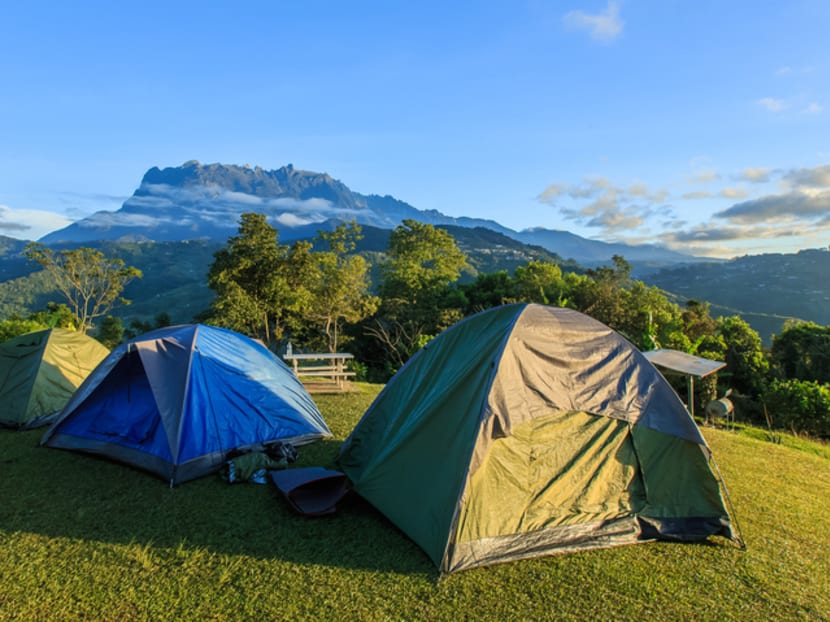Genting Highlands landslide: Tour operators say camping in Malaysia popular among Singaporeans, stress need for safety precautions
SINGAPORE — With the reopening of borders earlier this year, camping trips in Malaysia are popular with Singaporeans, commercial organisers said of such outings. In the wake of a deadly landslide at a campsite in Selangor, though, these operators said that campers should take some precautions, such as avoiding outings during the monsoon season and ensuring that camping sites have a valid permit.

- Some commercial camp organisers in Singapore said that camping trips in Malaysia are popular with Singaporeans
- Those planning to go camping overseas should take some precautions, they added
- Their comments came after the recent fatal landslide in Selangor near Genting Highlands
- Campers should try to avoid going during monsoon seasons when a landslide is more prone to occur
- They should also ensure that camp operators and sites have valid permits
SINGAPORE — With the reopening of borders earlier this year, camping trips in Malaysia are popular with Singaporeans, commercial organisers said of such outings. In the wake of a deadly landslide at a campsite in Selangor, though, these operators said that campers should take some precautions, such as avoiding outings during the monsoon season and ensuring that camping sites have a valid permit.
They added that Singaporeans thinking of camping in Malaysia should also engage guides there and experienced camp operators who are familiar with the sites and surrounding terrains.
This was in light of the disaster at Father’s Organic Farm in Batang Kali, Selangor — near popular tourist destination Genting Highlands — in the early hours of Dec 16 morning last week.
The tragedy has claimed the lives of 24 people, with another nine missing. They were among 94 people at the campsite, which Malaysian authorities have said was operating illegally since the site was licensed only for organic farming.
The Malaysian police have called in staff members from campsite to assist in an investigation.
PRECAUTIONARY MEASURES FOR CAMPERS
Mr Fayyadh M, co-founder of Prepper Asia, a company that provides emergency and disaster preparedness programmes, said that he has seen increased interest among Singaporeans to camp in Malaysia.
“The interest piqued during Covid-19 lockdown periods, (because) participating in outdoor activities was one of the few ways that people could gather and socialise,” he told TODAY.
“With the borders now open, Singaporean hikers are pursuing adventures in neighbouring countries, with camping and trekking trips to Mount Ledang, Mount Tahan and Mount Kinabalu becoming more common,” Mr Fayyadh said, referring to mountains in Melaka, Pahang and Sabah respectively.
The more conservative Singaporean will go for guided treks or camping trips at campsites that have amenities, while the more adventurous ones will opt for the off-beaten track, he added.
Mr Vijay Kumar, director of SGTrek, a Singapore-based company that provides outdoor travel services, also said that its camping trips in Malaysia are "usually full".
This is in part because the company takes in "a lower number of participants for camping activities", he added without elaborating.
Both Mr Fayyadh and Mr Kumar said that campers should take precautionary measures before embarking on such trips.
Avoid the monsoon seasons, for instance. This is because locations with inefficient drainage systems are more susceptible to flood and landslides during this period, which is typically from late September to January.
Both operators said that campers should also ensure that camp operators and individuals have valid permits for all activities and sites.
Mr Kumar said that campers should engage guides where they are holidaying and camp only at designated sites in national parks. They should also stay updated with the latest information about the campsite.
"Most of the Malaysia National Park guides and management are always very helpful, and they provide guests with all the latest information," he added.
"In case if you are camping with a local private landed campsite, do check with them if they are licensed... and what are all their safety management (procedures) before engaging their campsite."
Mr Fayyadh said that once campers are settled at the sites, they should do a visual check of the surroundings before setting up camp, especially when they are at a non-designated camping site such as nature reserves.
“They should look out for hazards such as fast-flowing water area, animal tracks, potential flood area, and deadfalls from trees,” he advised.
“Then, identify and understand nearby escape routes, as well as the location of major infrastructure in the area."
Campers should carry tools such as torchlights, a Swiss army knife, whistle and mobile phones.
They should inform their family about where they are going and how long they will be away.
“Social media is good to record your journey, too, but do not give too much information as it could risk a security threat,” Mr Fayyadh added.
As for the risk of landslide, he said that campers should look out for the following warning signs, so that they can alert others to evacuate as soon as possible to safer grounds if they feel that they are in danger:
- Barren hills, especially where land clearing has just occurred and the land is still red in colour
- Slanted and tilting trees. Since trees grow in the direction of the sun, trees that tilt at an angle different from surrounding trees could be an indicator of an impending landslide
- Cracks in the ground or in boulders or on cliffs
- Constant falling or sliding rocks and debris
- Flowing water that gradually increases in volume and carrying along mud or debris in the downward flow are signs that the land on higher ground cannot hold up the stress
- Unusual sounds coming from the ground
- Gases from underground, which may emit unusual smell
WHAT EXPERIENCED CAMPERS SAY
Mr Muhd Azuan, who used to camp regularly in Malaysia before Covid-19, said he was surprised to learn that the Father’s Organic Farm campsite had been operating without a permit, as he had seen YouTube videos of people camping in the area.
He said that whenever he camps in Malaysia, he usually does online research on the campsites first, checking out information such as its location, accessibility, how crowded it will be, the weather conditions and what features are near the site, such as a stream or a nice view.
“And if there’s news about flooding (in the area), that’s definitely a red flag and we (campers) won’t go. And if anyone in our circle goes, we will ask them for their first-hand experience,” the 34-year-old logistics officer said.
Mr Azuan, who has not been to Malaysia to camp since 2019, added that following the Selangor tragedy, he will take more precautions in future by checking online if the campsite to which he is headed has a legal permit to operate.
Another Singaporean who regularly camps in Malaysia, Mr Mohamed Fayyaz, said that he will usually make sure to go for camping trips with experienced campers from The Hangout, an outdoor enthusiasts group run by Malaysia-based Singaporean volunteers.
The 26-year-old intelligence analyst said that he has gone on off-road motorcycling trips with the group before and after the Malaysian borders reopened recently.
“I usually go for weekend trips with the group and we camp in Malaysia for one night. We make sure to have an experienced camper or a local guide who knows the terrain and can guide the campers well,” Mr Fayyaz added.
“To keep safe, we make sure to stick in groups, implement a buddy system, and remain contactable with phones or other communication devices like walkie talkies.”










